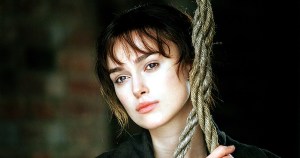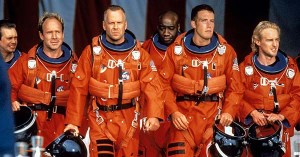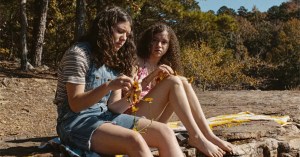RT Interview: William Moseley on His Last Narnia Adventure in Prince Caspian
Peter Pevensie shares memories from his final trip into C.S. Lewis' magical world.

William Moseley: In very simple terms, the first film was a children’s Narnia. This film is going to be an adult Narnia, and I say that with every implication as in we’re fighting adults this time, we’re not fighting mythical creatures anymore. Even Tilda Swinton as an actress is definitely a mythical creature! We’ve got a whole army of humans to fight this time.
Narnia’s changed. It’s 1300 years later, it’s not pastoral anymore, or idyllic. It’s dark and nasty and all the creatures we once knew, who roamed the land freely, have been pushed into the forest and the woods and forced to live this closed lifestyle. It’s about Caspian calling the kids back to save everyone from that and to bring this light, almost, back into it.
Of course we couldn’t do it without Aslan and he helps out, so that’s good. But I think this film is going to be very different for audiences, I have to say.
You guys are charged to bring the magic back to Narnia, but you were the least magical people in the first film…
WM: Right! I suppose we were the least, least magical out of everybody and that was sort of because we were going through it with the audience and taking the audience into this world – as we were seeing it, they were seeing it. In some ways Susan was everyone’s cynical voice, you know, which was quite funny. But this time it’s like, “Well, you did it last time, do it this time for us.”
Everyone expects it of us. For Peter, especially, his journey has completely changed. He used to be a very nice, considerate, moral person. Very selfless. And this time he’s quite selfish, I have to say, and he’s quite angry and frustrated and thinks he deserves more. The film starts with this huge fight sequence where he’s just angry and he’s lashing out and nobody respects him as a High King in London, of course – they think he’s a bit of a dick to be honest with you – and so he ends up going to Narnia and nobody respects him there, either, which he finds out just as he’s thinking all his dreams have come true. He has to learn this very important lesson of humility and that shapes his judgements from then onwards.
It’s also sad for him and Susan because this is their last journey into Narnia.
WM: It’s really sad, actually. I remember doing the scene with Aslan at the end and I said to Andrew, “Should we be crying in this?” Anna and I both wanted to bawl out – it was pretty much the final scene we did of the whole film and he was like, “Um… No, just be very stoic and reserved.” He was definitely right, because it’s sad for the audience and sad to say goodbye to Narnia but it’s also very hopeful. To some degree we’re passing Narnia on to Caspian. It’s almost like we’re passing the torch and going on to something else. We’re going back to England and doing what we have to do. We’ve learnt our lessons from Narnia.

Very nice of them to schedule it as one of the last scenes you shot.
WM: I know! It was one of the last scenes we did as the four of us and it was a really brilliant scene but it was a hard scene for me. I didn’t really know where I was going with it at the time. I didn’t know whether to play it sad or to play it hopeful or both, and for me at that point it was even like, Am I ever going to get another acting part again? [laughs] This is going to be it for me, forever! As an actor you’re always thinking that. I figured you get to Anthony Hopkins’ age and think, “Of course I’m going to get parts,” but I even read interviews with him where he says he feels he’ll never get another part again.
I guess that’s the challenge of the profession you’ve thus far been able to avoid having started in a big franchise.
WM: I know, it’s true. The only thing you can really hope for is just to keep going on the same line of quality. I really 100% believe, and I hope everyone else does too, that Narnia is a quality film and that it isn’t just there to make a bunch of money. I think that’s always been the drive of the director and the producer and all of the actors as well. So that’s really what I want to do next; something of quality and something I can be proud of.
But perhaps something on a slightly smaller scale?
WM: Yeah, I think so! [laughs] I can’t imagine myself doing something like Narnia again. I would love to do something with Ridley Scott, you know, some action/adventure or something like that. But I’d also love to do a dramatic piece. It’s really just whatever you read and take to.
I’d love to do a Michel Gondry film. That would ideal! I’d love to do an Almodovar film, you know, I think he’s very, very talented. I don’t care that people say he’s pretentious. So what? He’s a good director, he can be pretentious. Paul Thomas Anderson I really like – I loved There Will Be Blood. I’ve always loved the Coen brothers. There’s been a lot of depressing films out this year but they’re bloody brilliant films. Depressing as hell, but bloody brilliant.

Do you have an idea of what you’re going to be doing next?
WM: I’ve been reading loads of scripts but I really have no idea. For me, my taste isn’t limited to magical films, whatever I read and I like I go up for and a lot of the time it’s an American accent which can be quite trying, but I’m working on it as much as I can. Who knows what I’m going to do next, you know, there’s this Roman Legion project that I love that I might be too young for. There are so many things involved.
Do you enjoy auditioning?
WM: Yeah, I love taking meetings because I love hearing what other people have got to say. I used to not listen that much, but I’ve really learnt to listen to other people and to really listen to what they’re saying. I’ve found especially being on a film set, people have so many different stories, if you just listen you can pick up so much stuff. I try to listen as much as I can.
Peter and Susan pass the torch onto Prince Caspian at the end of the movie – has it felt like that in real life? Obviously, Ben Barnes will be continuing with Skandar and Georgie on Voyage of the Dawn Treader…
WM: I do, actually, it does feel like I’m passing it on to him. There was always this joke on set about how his sword was bigger than mine and all this kind of stuff, and finally I passed my sword onto him and I think he knows what the responsibility is.
It sounds weird and ridiculous, because I know we’re just actors in a film, but when you put so much of your heart into something and you spend so much time with someone – I even spent eighteen months auditioning for the part, let alone all the filming on top – you really do want to pass it over and to have them accept it with respect and I really think Ben Barnes will pull up trumps and if he doesn’t then I think Skandar will knock him into shape and get him there!
He’s yet to go through the whole world premiere experience, and I was there at the Royal Albert Hall for the premiere of the first and it was massive – there must be some knowledge you can impart to him there to prepare him!
WM: That premiere was mad, wasn’t it? But I don’t want to seem like I’m patronising him because he’s hugely experienced, you know, and he’s got loads to teach me. But to be honest, Narnia is huge. It’s colossal. And I think when Ben starts to see what it’s like in Japan, for instance, I think he’s just going to think how lucky he is. That’s all I thought. I’m so lucky to be here, so lucky I got the part and so lucky I had the chance to work so hard. I’m sure the same thing will strike him no doubt.
You’ve shot quite a bit of the film in Eastern Europe this time – how changed will Narnia be?
WM: Yeah, we had a different D.P. on this one – Karl Walter Lindenlaub – and he shot it really well. His shots are just beautiful – really, really stunning. Everything in every shot is absolutely beautiful. I think just because it was bigger this time and they had more to work with. People always ask if we shot it on green screen, which is a D.P.’s nightmare, but we really shot most of it on location. They literally just built everything. It was a battle scene, fine, we’ll built it. Aslan’s How, we’ll built it. Castle, we’ll build it. The D.P. has so much to work with, and so many angles to get and I think they’re struggling now to bring the film down because it’s so many minutes over because there’s so much good stuff in there!
Have you seen it yet?
WM: I haven’t, I’ve seen little bits here and there. I did ADR voiceover stuff, and I saw bits like the battle and the fights. It’s pretty epic, I’ve got to say. This one-on-one fight I do with Miraz – I know I’m completely biased and don’t take my judgements as sold, but I really think it’s going to be one of the best one-on-one fights anyone’s ever seen on screen. As a kid, that’s all I’d watch, action films. I watched this battle scene and I’ve never seen anything like it. We even had the camera on a 360 degree dolly and they had three cameras pitched in. I was with the head stunt guy because he wanted to do it with me. We’re spinning around fighting, and there are these three cameras filming at 90 frames a second so it’s in slow motion spinning all around and it looks so cool! This huge battlefield in the background. It’s pretty epic.

In the first film when you think of that scene with Peter and the wolf on the ice, he’s very nervous – this is really his chance to go back and have fun with everything he learned in Narnia the first time around.
WM: Yeah. The producer would always joke to me, “You know, I think Peter likes killing a little too much!” [laughs] I was loving it, you know, I love all the physical stuff. I was getting in there and getting stuck in and learning all of these cool physical moves. You could fully see that I was really into it. They were like, “I think we should pull that back a bit!”
Is the stunt work your favourite part?
WM: Well, it’s very satisfying for me and it sounds weird but it’s very easy for me, I don’t find it that hard. But the acting is definitely my favourite bit, and the most rewarding. When I’ve worked on a scene like crazy and I’ve worked on these lines and I’ve given all I can to it and I come off and the director says it was really nice, that means so much to me. Acting isn’t easy – whoever tells you acting is easy is lying because it’s not easy at all and you have to work at it – when you get that sense of achievement at the end of the day where you know you’ve done a good job and you’ve done your scene well, it’s really uplifting and that’s pretty much why I’m in it.
How has your relationship with Andrew developed?
WM: Andrew’s a very visual director. He sees everything before he shoots it. I suppose he’s a bit like Alfred Hitchcock, who’d storyboard everything to the smallest detail. For Andrew, everything has to be perfect down to the last branch on a tree, you know, he even sees that. It’s so hard for him, I think, on a film as big as Prince Caspian, to give his time up for each of us, so it’s very much like we do our thing and then Andrew gives us the time and we have to respect that he has to go off and he can’t spend time having a cup of tea with us. I remember even at lunch they’d bring a laptop up to him to have him approve things at lunchtime. He worked his guts out and I take my hat off to him for doing that, you know.
Is it a career that’s ever appealed to you?
WM: Yeah, you know, I really would love to direct and but feel like everything’s a mountain. I feel I’m very-much still at the bottom of this acting mountain, you know, trying to work my way up that one. Hopefully, maybe half way up, we’ll see if I might be able to do some directing.
I’ve so many ideas for films but it’s so hard trying to script them in a concise way and in a way that people might like. You don’t know what people might like, you just try to do what you can, you know. It’s really hard. You’re trying to get this idea out that you think is great and you tell someone and they’re like, “That sounds crap.”

I’m sure it’s all to come – to have Disney put their faith in you for these two giant movies is a great achievement. Because, without wanting to be intimidating, these are massive movies…
WM: Well it’s definitely intimidating and I wouldn’t want to say it isn’t. You mess up a take on a small film, you can maybe go back and do it in a couple of minutes. You mess up on this kind of film and it can maybe take an hour to reset one shot. You fall over while you’re running and 2,000 people just collectively groan. There’s definitely a lot of pressure.
But I’ve always been a competitive person to some degree. When there’s a bit of pressure I can sometimes either do well under it or not do well, it depends. When it doesn’t go well you have to use music or something like that to help you into it. When it is going well you can embrace the pressure and use that energy in your scenes, your fight scenes especially because you can really give it some.
I was thinking today, I was playing a game of snooker with my friend and I’m really terrible at snooker – I’m not patient enough–
Hang on, you’re an actor and you’re not patient enough for snooker?
WM: [laughs] I know, I know! I get really emotional because I just want it to happen, you know, I want it to happen. So I was playing this game of snooker and it comes down to, I’ve got to pot the pink and black to win the game, and I can’t even miss it. I pot the pink and I’ve lined up the black and he’s looking down and you can feel the pressure. I just whacked it and luckily it went it, but sometimes I’ll whack it and it might just come out, you know… It’s the story of life, isn’t it?!






